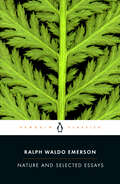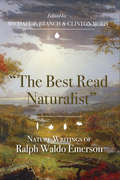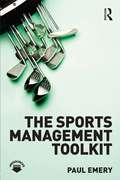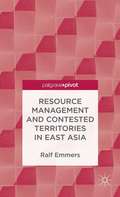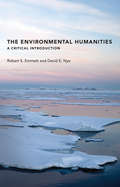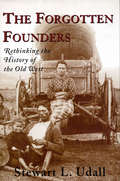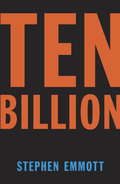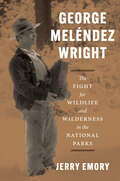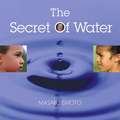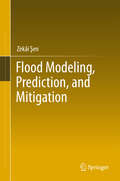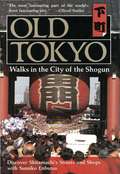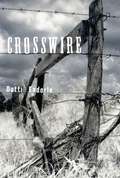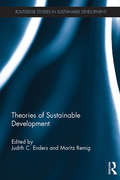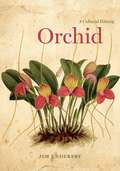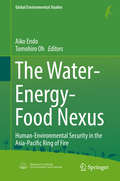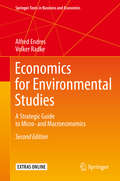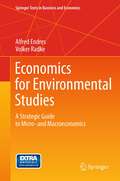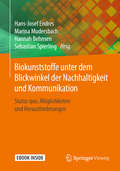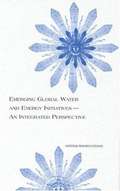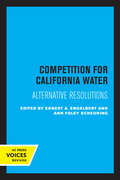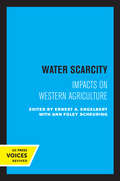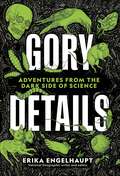- Table View
- List View
Nature and Selected Essays
by Ralph Waldo EmersonAn indispensible look at Emerson's influential life philosophyThrough his writing and his own personal philosophy, Ralph Waldo Emerson unburdened his young country of Europe's traditional sense of history and showed Americans how to be creators of their own circumstances. His mandate, which called for harmony with, rather than domestication of, nature, and for a reliance on individual integrity, rather than on materialistic institutions, is echoed in many of the great American philosophical and literary works of his time and ours, and has given an impetus to modern political and social activism.Larzer Ziff's introduction to this collection of fifteen of Emerson's most significant writings provides the important backdrop to the society in which Emerson lived during his formative years.For more than seventy years, Penguin has been the leading publisher of classic literature in the English-speaking world. With more than 1,700 titles, Penguin Classics represents a global bookshelf of the best works throughout history and across genres and disciplines. Readers trust the series to provide authoritative texts enhanced by introductions and notes by distinguished scholars and contemporary authors, as well as up-to-date translations by award-winning translators.
The Best Read Naturalist": Nature Writings of Ralph Waldo Emerson (Under the Sign of Nature: Explorations in Ecocriticism)
by Ralph Waldo Emerson Michael P. Branch Clinton MohsRalph Waldo Emerson is one of the most important figures in American nature writing, yet until now readers have had no book devoted to this central theme in his work. "The Best Read Naturalist" fills this lacuna, placing several of Emerson’s lesser-known pieces of nature writing in conversation with his canonical essays. Organized chronologically, the thirteen selections--made up of sermons, lectures, addresses, and essays--reveal an engagement with natural history that spanned Emerson’s career. As we watch him grapple with what he called the "book of nature," a more environmentally connected thinker emerges--a "green" Emerson deeply concerned with the physical world and fascinated with the ability of science to reveal a correspondence between the order of nature and that of the mind. "The Best Read Naturalist" illuminates the vital influence that the study of natural history had on the development of Emerson’s mature philosophy.
The Collected Works of Ralph Waldo Emerson Volume I: Nature, Addresses, and Lectures
by Ralph Waldo Emerson Alfred R. Ferguson Robert E. Spiller Waldron P. BelknapRecords the creative and intellectual development of Emerson as a man of letters through a collection of his writings.
The Sports Management Toolkit
by Paul EmeryThe Sports Management Toolkit is a practical guide to the most important management tools and techniques available to those working in the sport and leisure industries. Designed to bridge the gap between the classroom and the workplace, it includes ten free-standing chapters, each of which provides a detailed introduction to best practice in one of the core sports management disciplines. Written in a clear and straightforward style, and free of management jargon, the book covers all the key functional areas of contemporary sports management, including: marketing performance management risk management human resource management project management finance. Each chapter includes a detailed, step-by-step description of the key tools and techniques and their application; a ‘real world’ case study to demonstrate the technique in action, plus an extensive guide to further resources and a series of self-test questions. The final chapter offers an extended, integrated case-study, demonstrating how all the key management techniques are combined within the everyday operation of a successful sport or leisure organization. This book is essential reading for all students of sport and leisure management, and for all managers looking to improve their professional practice.
Resource Management and Contested Territories in East Asia
by Ralf EmmersRalf Emmers discusses the significance of natural resources as a source of inter-state cooperation and competition in East Asia, assessing whether the joint exploration and development of resources can act as a means to reduce tensions in contested territories. Does the joint management of natural resources in the absence of a negotiated maritime delimitation constitute a feasible strategy to de-escalate maritime sovereignty disputes in East Asia? Can cooperative resource exploitation be separated from nationalist considerations and power politics calculations? Alternatively, should the prospect for joint exploration in disputed waters be expected to raise rather than defuse territorial conflicts, especially if abundant resources are eventually discovered? If this were true, should exploration schemes be postponed until sovereignty disputes have been resolved? Emmers addresses these questions by examining the overlapping sovereignty claims in the Sea of Japan and the East and South China Seas.
The Environmental Humanities: A Critical Introduction (The\mit Press Ser. #1)
by Robert S. Emmett David E. NyeA concise overview of this multidisciplinary field, presenting key concepts, central issues, and current research, along with concrete examples and case studies.The emergence of the environmental humanities as an academic discipline early in the twenty-first century reflects the growing conviction that environmental problems cannot be solved by science and technology alone. This book offers a concise overview of this new multidisciplinary field, presenting concepts, issues, current research, concrete examples, and case studies. Robert Emmett and David Nye show how humanists, by offering constructive knowledge as well as negative critique, can improve our understanding of such environmental problems as global warming, species extinction, and over-consumption of the earth's resources. They trace the genealogy of environmental humanities from European, Australian, and American initiatives, also showing its cross-pollination by postcolonial and feminist theories. Emmett and Nye consider a concept of place not synonymous with localism, the risks of ecotourism, and the cultivation of wild areas. They discuss the decoupling of energy use and progress, and point to OECD countries for examples of sustainable development. They explain the potential for science to do both good and harm, examine dark visions of planetary collapse, and describe more positive possibilities—alternative practices, including localization and degrowth. Finally, they examine the theoretical impact of new materialism, feminism, postcolonial criticism, animal studies, and queer ecology on the environmental humanities.
The Forgotten Founders: Rethinking The History Of The Old West
by David Emmons Stewart L. UdallIn The Forgotten Founders, Stewart Udall draws on his vast knowledge of and experience in the American West to make a compelling case that the key players in western settlement were the sturdy families who travelled great distances across forbidding terrain to establish communities there. He offers an illuminating and wide-ranging overview of western history and those who have written about it, challenging conventional wisdom on subjects ranging from Manifest Destiny to the importance of Eastern capitalists to the role of religion in westward settlement.Stewart Udall argues that the overblown and ahistorical emphasis on a "wild west" has warped our sense of the past. For the mythical Wild West, Stewart Udall substitutes a compelling description of an Old West, the West before the arrival of the railroads, which was the home place for those he calls the "wagon people," the men and women who came, camped, settled, and stayed. He offers a portrait of the West not as a government creation or a corporate colony or a Hollywood set for feckless gold seekers and gun fighters but as primarily a land where brave and hardy people came to make a new life with their families. From Native Americans to Franciscan friars to Mormon pioneers, these were the true settlers, whose goals, according to Stewart Udall were "amity not conquest; stability, not strife; conservation, not waste; restraint, not aggression." The Forgotten Founders offers a provocative new look at one of the most important chapters of American history, rescuing the Old West and its pioneers from the margins of history where latter-day mythmakers have dumped them. For anyone interested in the authentic history of the American West, it is an important and exciting new work.
Ten Billion
by Stephen EmmottA VINTAGE ORIGINALJust over two hundred years ago, there were one billion humans on Earth.There are now over seven billion of us.And, sometime this century, the world population will reach at least ten billion.Deforestation. Desertification. Species extinction. Global warming. Growing threats to food and water. The driving issues of our times are the result of one huge problem: Us. As the population continues to grow, our problems will increase. And this means that every way we look at it, a planet of ten billion people is likely to be a nightmare. Stephen Emmott, a scientist whose lab is at the forefront of research into complex natural systems, sounds the alarm. TEN BILLION is a snapshot of our planet, and our species, approaching a crisis, and a stark analysis of where this leaves us. TEN BILLION is not another climate book. TEN BILLION is a book about us.From the Trade Paperback edition.thing but a "green" book. And it's not another book about the climate. TEN BILLION is a book about us.From the Trade Paperback edition.
George Meléndez Wright: The Fight for Wildlife and Wilderness in the National Parks
by Jerry EmoryThe first biography of a visionary biologist whose groundbreaking ideas regarding wildlife and science revolutionized national parks. When twenty-three-year-old George Meléndez Wright arrived in Yosemite National Park in 1927 to work as a ranger naturalist—the first Hispanic person to occupy any professional position in the National Park Service (NPS)—he had already visited every national park in the western United States, including McKinley (now Denali) in Alaska. Two years later, he would organize the first science-based wildlife survey of the western parks, forever changing how the NPS would manage wildlife and natural resources. At a time when national parks routinely fed bears garbage as part of “shows” and killed “bad” predators like wolves, mountain lions, and coyotes, Wright’s new ideas for conservation set the stage for the modern scientific management of parks and other public lands. Tragically, Wright died in a 1936 car accident while working to establish parks and wildlife refuges on the US-Mexico border. To this day, he remains a celebrated figure among conservationists, wildlife experts, and park managers. In this book, Jerry Emory, a conservationist and writer connected to Wright’s family, draws on hundreds of letters, field notes, archival research, interviews, and more to offer both a biography of Wright and a historical account of a crucial period in the evolution of US parks and the wilderness movement. With a foreword by former NPS director Jonathan B. Jarvis, George Meléndez Wright is a celebration of Wright’s unique upbringing, dynamism, and enduring vision that places him at last in the pantheon of the great American conservationists.
George Meléndez Wright: The Fight for Wildlife and Wilderness in the National Parks
by Jerry EmoryThe first biography of a visionary biologist whose groundbreaking ideas regarding wildlife and science revolutionized national parks. When twenty-three-year-old George Meléndez Wright arrived in Yosemite National Park in 1927 to work as a ranger naturalist—the first Hispanic person to occupy any professional position in the National Park Service (NPS)—he had already visited every national park in the western United States, including McKinley (now Denali) in Alaska. Two years later, he would organize the first science-based wildlife survey of the western parks, forever changing how the NPS would manage wildlife and natural resources. At a time when national parks routinely fed bears garbage as part of “shows” and killed “bad” predators like wolves, mountain lions, and coyotes, Wright’s new ideas for conservation set the stage for the modern scientific management of parks and other public lands. Tragically, Wright died in a 1936 car accident while working to establish parks and wildlife refuges on the US-Mexico border. To this day, he remains a celebrated figure among conservationists, wildlife experts, and park managers. In this book, Jerry Emory, a conservationist and writer connected to Wright’s family, draws on hundreds of letters, field notes, archival research, interviews, and more to offer both a biography of Wright and a historical account of a crucial period in the evolution of US parks and the wilderness movement. With a foreword by former NPS director Jonathan B. Jarvis, George Meléndez Wright is a celebration of Wright’s unique upbringing, dynamism, and enduring vision that places him at last in the pantheon of the great American conservationists.
The Secret of Water
by Masaru EmotoDr. Masaru Emoto's stunning water-crystal photographs have enchanted millions of people in his many books. His groundbreaking work has shown that thoughts and words have a direct effect on water- crystal formation, and since our bodies are mostly water, our thoughts and words certainly affect not only ourselves but the world around us. In The Secret of Water, Dr. Emoto brings water's message of love, peace, and hope to the next generation in his first children's book. Entertaining and educational, this book offers an understanding of water that will encourage parents and children alike to value and give thanks to our most precious resource. In 2003 the United Nations proclaimed the years 2005 to 2015 as its International Water for Life Decade, which urges citizens of the world to take individual responsibility to learn all about water. In a time wrought with environmental catastrophes and natural disasters, The Secret of Water shows the necessity of protecting water and offers a message of hope and empowerment. Help us shift consciousness
The Secret of Water
by Masaru EmotoMasaru Emoto's photography and spiritual thinking has enabled us to understand more clearly how our actions effect our environment. His insight into water has reached millions of adults around the world and now, with his first book aimed at children, a younger audience can receive his message and help to lead the world toward healing and progress. This comprehensive, easy-to-understand guide to his theories is attractively packaged for children so they too can learn about the power and hidden messages in water.
Flood Modeling, Prediction and Mitigation
by Zekâi ŞenThis book draws on the author’s professional experience and expertise in humid and arid regions to familiarize readers with the basic scientific philosophy and methods regarding floods and their impacts on human life and property. The basis of each model, algorithm and calculation methodology is presented, together with logical and analytical strategies. Global warming and climate change trends are addressed, while flood risk assessments, vulnerability, preventive and mitigation procedures are explained systematically, helping readers apply them in a rational and effective manner. Lastly, real-world project applications are highlighted in each section, ensuring readers grasp not only the theoretical aspects but also their concrete implementation.
Old Tokyo
by Sumiko Enbutsu Ryosuke Ishida"Sumiko Enbutsu, sure-footed and lively, leads us through Tokyo's old downtown. Sensitive to the character of each varied neighborhood, she brings a sharp eye to its half-hidden history, its traditional shops, and its most appealing restaurants. Old Tokyo is a boon to residents and visitors alike".
Crosswire
by Dotti EnderleWhen an 1883 drought drives free-range cattlemen to shred Texas ranchers' barbed wire fences and steal water, thirteen-year-old Jesse works hard to help while dealing with his father and brothers falling-out and his own fear of guns.
Theories of Sustainable Development (Routledge Studies in Sustainable Development)
by Judith C. Enders Moritz RemigWhile sustainability has become a buzzword in discussions about the environment and development, work on theories of sustainable development has received much less attention. However, theory is vital as understanding the origins and development of the concept is the key to achieving successful implementation of sustainability. This book offers an interdisciplinary collection of research articles on the theories of sustainable development, drawing on a wide range of subjects including history, politics, governance, complex systems, economics and philosophy. It advocates viewing sustainable development not only as the establishment of a permanent, globally practicable and future-capable mode of life and economics, but as a complex array of problems involving a wide range of social-scientific and humanistic disciplines. This innovative approach means that the book is oriented toward current problems, not toward the established academic boundaries, and it draws out lessons that are relevant for those studying and working in sustainability across the world. This book will be of great interest to researchers and students of sustainable development and environmental politics, as well as practitioners working with sustainable development in politics, business, administration, and civil society organizations.
Orchid: A Cultural History
by Jim EndersbyAt once delicate, exotic, and elegant, orchids are beloved for their singular, instantly recognizable beauty. Found in nearly every climate, the many species of orchid have carried symbolic weight in countless cultures over time. The ancient Greeks associated them with fertility and thought that parents who ingested orchid root tubers could control the sex of their child. During the Victorian era, orchids became deeply associated with romance and seduction. And in twentieth-century hard-boiled detective stories, they transformed into symbols of decadence, secrecy, and cunning. What is it about the orchid that has enthralled the imagination for so many centuries? And why do they still provoke so much wonder? Following the stories of orchids throughout history, Jim Endersby divides our attraction to them into four key themes: science, empire, sex, and death. When it comes to empire, for instance, orchids are a prime example of the exotic riches sought by Europeans as they shaped their plans for colonization. He also reveals how Charles Darwin's theory of evolution became intimately entangled with the story of the orchid as he investigated their methods of cross-pollination. As he shows, orchids--perhaps because of their extraordinarily diverse colors, shapes, and sizes--have also bloomed repeatedly in films, novels, plays, and poems, from Shakespeare to science fiction, from thrillers to elaborate modernist novels. Featuring many gorgeous illustrations from the collection of the Royal Botanic Gardens, Kew, Orchid: A Cultural History tells, for the first time, the extraordinary story of orchids and our prolific interest in them. It is an enchanting tale not only for gardeners and plant collectors, but anyone curious about the flower's obsessive hold on the imagination in history, cinema, literature, and more.
The Water-Energy-Food Nexus: Human-environmental Security In The Asia-pacific Ring Of Fire (Global Environmental Studies)
by Aiko Endo Tomohiro OhThis book highlights the water-energy-food nexus as one of the most important and fundamental global environmental issues facing the world. Climate and social changes are putting increased pressure on water, energy and food resources. As water is the central aspect within this cluster, the book focuses on the inherent tradeoffs in water resources between producing/consuming energy and food. In addition, it discusses an inter- and trans-disciplinary approach to understanding the complexity of the water-energy-food nexus system, and creating policy options to reduce the tradeoffs among resources. The content integrates a variety of academic disciplines, including not only the natural sciences (e.g. hydrology, coastal oceanography, costal aquatic bioscience, fisheries, environmental earth science etc.) but also the humanities and social sciences (e.g. marine policy, environmental energy policy, resource governance, policy process theory etc.). The book can be used as a textbook for undergraduate and graduate-level sustainability science courses. Further, its practical content and trans-disciplinary approach to addressing nexus issues with stakeholders offers vital information for practitioners and administrators alike.
Economics for Environmental Studies: A Strategic Guide to Micro- and Macroeconomics (Springer Texts in Business and Economics)
by Alfred Endres Volker RadkeThis textbook provides a concise introduction to micro- and macroeconomics and demonstrates how economic tools and approaches can be used to analyze environmental issues. Written in an accessible style without compromising depth of the analysis, central issues in the public policy debate on environmental problems and environmental policy are discussed and analyzed from an economics perspective. The book is meant as an introductory (and in some parts intermediate) text for undergraduate students in environmental sciences without a background in economics. It also serves as a companion for economists interested in a presentation of the micro and macro foundations of environmental economics, in a nutshell.The second edition has been revised, updated and extended in may ways, for instance by adding a microeconomic section on environmental technical change, a discussion of the significance of technical change for a sustainable development and a considerably extended macroeconomic section on economic growth.
Economics for Environmental Studies: A Strategic Guide to Micro- and Macroeconomics (Springer Texts in Business and Economics)
by Alfred Endres Volker RadkeAn understanding of fundamental economic concepts is essential for students in environmental studies programs around the world. The present textbook addresses their needs, providing a concise introduction to micro- and macroeconomics and demonstrating how these economic tools and approaches can be used to analyze environmental issues. Written in an accessible style without compromising depth of the analysis, central issues in the public policy debate on environmental problems and environmental policy are discussed and analyzed from an economics perspective.The book is meant both as an introductory text for undergraduate students in environmental sciences without a background in economics, and as a companion for economists interested in a presentation of the micro and macro foundations of environmental economics, in a nutshell.
Biokunststoffe unter dem Blickwinkel der Nachhaltigkeit und Kommunikation: Status quo, Möglichkeiten und Herausforderungen
by Hans-Josef Endres Marina Mudersbach Hannah Behnsen Sebastian SpierlingDas Buch zeigt, wie eine Nachhaltigkeitsbewertung von Biokunststoffen gelingen kann und wie die Ergebnisse einer solchen Bewertung ausfallen. Es analysiert die öffentliche Wahrnehmung beim Verbraucher sowie die politischen Rahmenbedingungen von Biokunststoffen.
Emerging Global Water and Energy Initiatives-- An Integrated Perspective
by Global Energy Water Cycle Experiment Gewex PanelThe National Academies Press (NAP)--publisher for the National Academies--publishes more than 200 books a year offering the most authoritative views, definitive information, and groundbreaking recommendations on a wide range of topics in science, engineering, and health. Our books are unique in that they are authored by the nation's leading experts in every scientific field.
Competition for California Water: Alternative Resolutions
by Ernest A. Engelbert Ann Foley ScheuringCalifornia’s water is at the center of an intense economic and political struggle. A balance between supply and demand must be reached, but it is far from certain that all Californians will get as much water as they want at a price they feel is right. Competition for California Water presents essential information on key issues, including: Costs: What would be the yields and what would be the costs, in dollars as well as less tangible values, of developing new sources of water? Cost-sharing: How much of the cost of water development and distribution should be borne by the general public, and how much by water users and other beneficiaries? Environmental protection: To what extent should environmental values be protected? Conservation: To what extent can the need for new water development be offset by conservation and more efficient use of water? Institutional reform: Can changes in the laws and institutions of California produce a more efficient system of water supply and management? Agriculture: How much increase in cost and/or loss of water can California agriculture bear and still remain competitive? Thirty-one experts on all aspects of this topic project alternative futures for California’s water supply. Written in nontechnical language, Competition for California Water is an invaluable source of information for Californians concerned with the future of their state.This title is part of UC Press's Voices Revived program, which commemorates University of California Press’s mission to seek out and cultivate the brightest minds and give them voice, reach, and impact. Drawing on a backlist dating to 1893, Voices Revived makes high-quality, peer-reviewed scholarship accessible once again using print-on-demand technology. This title was originally published in 1982.
Water Scarcity: Impacts on Western Agriculture
by Ernest A. Engelbert Ann Foley ScheuringAgricultural production in the semi-arid western United States is dependent on irrigation. Population in the seventeen western states has been and is expected to continue increasing. Groundwater levels are declining throughout the region with long-term pumping and increased demands leading to greater pumping lifts and costs, land subsidence, and salt water intrusion into groundwater basins. Construction and operation costs of future water development in these states will be great, both in dollars and in economic and social effects. Competition for the available water supply due to increased demands in both agricultural and non-agricultural sectors continues to increase. Although considerable attention has been given to some aspects of declining water supplies for irrigated agriculture in particular areas, this is the first volume to adress in a comprehensive manner the effects of scarce water supplies on agricultural production and the resultant impacts at regional, state, national, and international levels. Over seventy experts, representing all the major physical and social sciences as well as industries examine the issues and conclude that important decisions must be made at all levels of government and private enterprise if the prosperity and quality of life in the region are to be maintained. Specific technical, economic, institutional, and managerial solutions are recommended to forestall an impending water crisis. All segments of society--agriculturalists, urbanites, food processors, land developers, environmentalists, and others--have major stakes in the outcome of any action for future water supplies and distribution in the West. This title is part of UC Press's Voices Revived program, which commemorates University of California Press's mission to seek out and cultivate the brightest minds and give them voice, reach, and impact. Drawing on a backlist dating to 1893, Voices Revived makes high-quality, peer-reviewed scholarship accessible once again using print-on-demand technology. This title was originally published in 1984.
Gory Details: Adventures From The Dark Side Of Science
by Erika EngelhauptUsing humour and real science in the tradition of Mary Roach, this groovy narrative from the author of National Geographic's popular Gory Details blog illuminates the gross, strange, morbid, and outright absurd realities of our bodies, our earth, and our universe. Filled to the brim with far-out facts, this wacky, funny, and informative narrative takes us on a fascinating journey through the astonishing world of science. With Erika Engelhaupt, founding editor of National Geographic's Gory Details blog, as your guide, all your weirdest and wildest fascinations will be illuminated. From the biologist who endured countless honeybee stings to test which spot was the most painful to the dollhouse-sized replicas of crime scenes built to analyze blood splatter to NASA's enduring dilemma--do women need to have their periods in space?--this entertaining book explores oft-ignored but alluring facets of biology, anatomy, space exploration, nature, and more. Featuring top-notch reporting, interviews with leading researchers in the field, and a healthy dose of wit, Gory Details depicts the world's most intriguing real-world applications of science in all their glory--making geekiness cool all over again!
